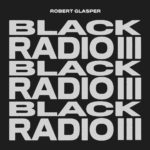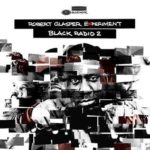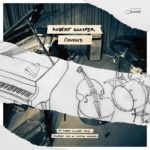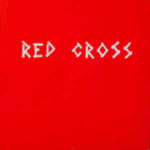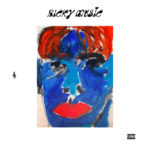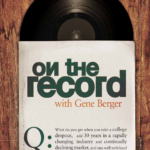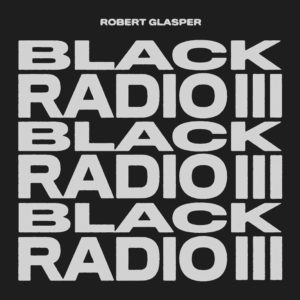
In the liner notes for the third installment of pianist ROBERT GLASPER’s BLACK RADIO series, Glasper’s thank-you list consists of a single line: “Thanks to the Universe”—a somewhat odd choice from a musician who’s fostered such a communal spirit over a career that reads like an endless list of musical get-togethers.
Like so many of his previous efforts, the sheer number, caliber and range of guests who appear on BLACK RADIO III just jumps off the page, enticing listeners to imagine what each successive musical pile-up is going to sound like. Even Glasper’s dad remarks about all the collaborations during one of the album’s interludes, referring to his son’s creative workspace as “the lab.”
Get Black Radio III on LP, CD and chartreuse vinyl HERE.
Hip-hop lovers accustomed to seeing features on every tracklist might not be as impressed as Pops, but Glasper curates his albums almost as if he were putting together a festival lineup—the kind where you’re able to hear faint traces of music coming from another stage off in the distance. Here, though, the disparate elements tend to align, and it should come as no surprise to fans that Black Radio III epitomizes Glasper’s knack for coaxing fireworks out of other musicians while keeping the mood supremely laid-back.
Eight of the 13 tracks feature multiple guests—including India.Arie, Q-Tip, Meshell Ndegeocello, Esperanza Spalding, Common and Ty Dolla $ign, to name just a few—seemingly mashed together, as if Glasper loves to push contrast to the point where he flirts with, but never quite allows things to tip over into chaos. The staccato, machine gun-like phrasing of Run The Jewels mouthpiece and outspoken social critic Killer Mike, for example, slots right in next to the silky-smooth croon of BJ The Chicago Kid on “Black Superhero,” the latest feature to showcase Glasper’s long-running love for neo soul and its modern-day offshoots.
Black Radio III kicks into high gear with the organ-driven “Why We Speak,” which pairs polyglot jazz bassist and singer Esperanza Spalding alongside A Tribe Called Quest leader Q-Tip. Remarkably, Glasper doesn’t actually increase the tempo or attack, and yet the energy level takes off as Spalding and Q-Tip call and respond in a stirring mishmosh of Spanish, French and English. Spalding’s chopped-up backing vocals give the song a semi-automated temperament that’s oddly enlivening (along the same lines as Janelle Monae’s playful robot persona), while Q-Tip showcases a flair for melody that most of his fans probably didn’t even know he had—two prime examples of Glasper’s gift for bringing out the unexpected in people.
Black Radio III makes a rather compelling case for jazz and hip-hop as mutually sustaining forms that not only beautify and propel one another forward, but also provide the inspiration for the rest of us to do the same amongst ourselves. The album grapples openly with America’s collective inability to come to terms with the paradox of being fascinated by a people and a culture that it’s put so much energy into denigrating. “If I was facing death,” Killer Mike rhymes on “Black Superhero,” “then I could ask one thing of God / I would ask for every n**** to be free here and abroad / and to be rightfully celebrated as a child of God.”
Much like Glasper has shown us the way to a middle plane that exists between hip-hop and jazz, Black Radio III aspires to the sacred (love, transcendence, peace from persecution) while attending to the profane (oppression, a police officer’s knee on the neck of dying man calling for his mother, and everything that image connotes about our justice system). On “Black Superhero,” for example, Killer Mike also reiterates his pro-gun stance and invokes the slogan “give me liberty or give me death,” intentionally—and ingeniously—toying with the fact that listeners will automatically associate his language with right-wing values. When Black Radio III dares to be this thought-provoking, Glasper and company tend to keep it subtle.
At the end of the day, though, practically every note on this album shines with the splendor of the African-American contribution to music, and that’s the triumph here. When “Everybody Love” segues into “It Don’t Matter,” for example, the mood glides seamlessly between early-2000s neo soul and classic ‘70s soul. As a pretend radio DJ, Glasper has quite the supple touch, and his nostalgia for the glory days of both periods shines through. But as a real-life composer, he writes piano progressions that take your breath away, and Black Radio III is filled with them. Ultimately, it’s Glasper’s ability to write for, lead and listen to other musicians in equal measure that makes Black Radio III as vital and promising a statement as its predecessors.
Black Radio III is in-stock now at Horizon Records and in our webstore on LP, chartreuse-colored vinyl LP and CD. And check out these other Robert Glasper releases as well!
